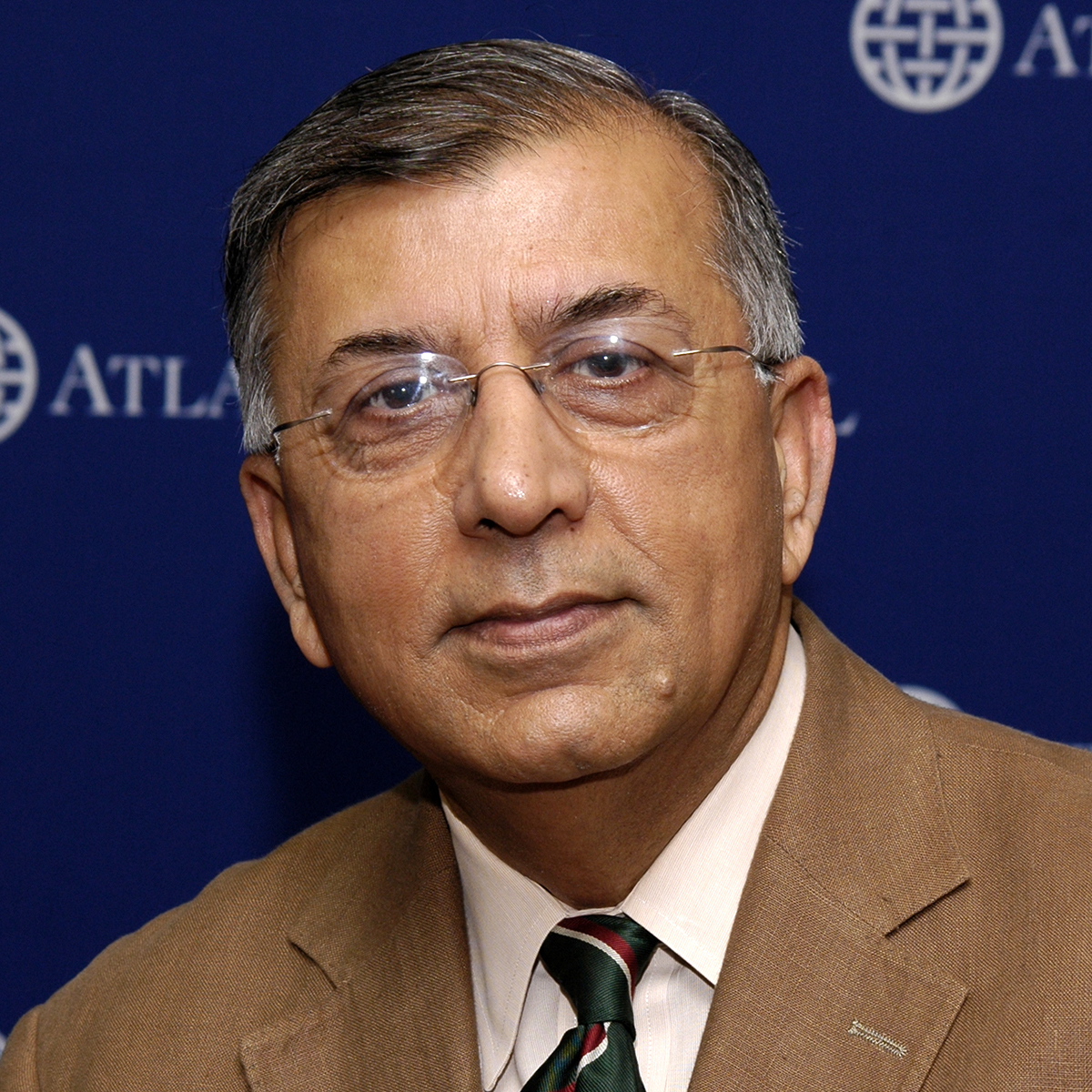
Shuja Nawaz, director of the Atlantic Council’s South Asia Center, appeared on PBS NewsHour to discuss the issue of strained U.S.-Pakistan relations. Tensions between the two countries have escalated following the release of a CIA contractor charged with killing two Pakistanis, which was immediately followed by U.S. drone strikes that killed 40 civilians.
The show’s transcript and video can be found below and on the PBS NewsHour site.
Transcript:
GWEN IFILL: Two old allies are at potentially dangerous loggerheads as Pakistan, a key partner in the fight against terrorism, openly demands the U.S. limit covert activities on the ground.
The concerns come in the wake of a U.S. drone attack that killed 40 Pakistani civilians and uproar over the release of a CIA contractor who shot and killed two Pakistanis in Lahore. The tensions apparently came to a head yesterday at a meeting between CIA Director Leon Panetta and Pakistan’s intelligence chief, Lt. Gen. Ahmed Shuja Pasha.
For more, we turn to Shuja Nawaz, the director of the South Asia Center at the Atlantic Council and the author of “Crossed Swords: Pakistan, Its Army, and the Wars Within.”
Welcome.
You were recently in Pakistan. Does this represent a new break or a continuation of the building tensions?
SHUJA NAWAZ, The Atlantic Council: I think this is a very sharp escalation of the war of words between the United States and Pakistan. And it really reflects the very deep-seated anger that I could feel in my conversations with senior military and intelligence officials in Pakistan at what they thought was a very striking use of tactical weapons inside Pakistan, which risked damaging the strategic alliance between the two countries.
GWEN IFILL: Now, this is not new, this unhappiness about the use of drones. Is there something — was it the CIA contractor, the Raymond Davis case that sparked it? Why the meeting yesterday here in Washington?
SHUJA NAWAZ: I think it’s a culmination of a number of things. The Raymond Davis case was merely a symptom of this difficult relationship.
There has been building over time a feeling inside Pakistan that they felt they didn’t get the trust that — and the respect that they deserve from their U.S. counterparts. The U.S., of course, feels that the Pakistanis haven’t done enough for them in return, particularly in the battle against the Afghan Taliban that have sanctuary in Pakistan.
But there is a co-dependency between these two strategic partners. And I think that was being lost in the tactical moves that were evident.
GWEN IFILL: So, what does the U.S. do at this point? Are there concessions that they are prepared to make? And are there concessions that the Pakistanis are prepared to make for this co-dependency to continue?
SHUJA NAWAZ: I think it’s critical that they get together and agree on the strategic objectives, yet again, to reaffirm those, and to make sure that any of the tactical moves that do occur don’t undermine those.
Without that, there will be targets of opportunity for the CIA drone attacks. But now I guess the CIA will be much better prepared to share information with the ISI, because if it doesn’t, then we’re going to see a repeat of this unhappiness.
What I heard was that the army chief in his private message to the United States threatened that, if he were pushed, he would react. And another senior military official has been quoted as saying that they might even shoot down the drones. I think this is probably rhetoric, but there is some basis for it, and that, that, one needs to be careful about.
GWEN IFILL: It sounds like all the parties in this dispute aren’t necessarily on the same page. ISA — ISI, which is Pakistani intelligence, obviously is at loggerheads or at least there’s some friction with the CIA. And the U.S. Embassy on the ground isn’t necessarily speaking the same language that maybe the Pakistani military is.
SHUJA NAWAZ: I think the embassy on the ground is now much more aware of what’s happening inside Pakistan. The difference is probably in the relationship between the CIA and the ISI. And this visit of yesterday will certainly have helped clarify some of those issues.
GWEN IFILL: The potential of them shooting our drones from the sky, is — how much of that is trying to send a domestic message inside of Pakistan, and how much of that is a real threat which you can imagine ever coming true?
SHUJA NAWAZ: I think they are very aware of the domestic pressures on them. In fact, after this attack that killed reportedly 41 people at a place called Datta Khel in North Waziristan, it was quite clear that the Pakistanis were being blamed for not protecting the borders.
A number of tribal elders sent a message saying, we hold the army chief, General Kayani, and the head of the ISI, Gen. Shuja Pasha, responsible for those deaths. And I think the army is very cognizant of public opinion in Pakistan.
GWEN IFILL: Is there still a common agreement about what the goal is along the border there? Or is this — and from the U.S. point of view, obviously, to stop the seepage that would create tensions in Afghanistan, but is there a common agreement about what you do about that?
SHUJA NAWAZ: I think there’s common agreement about the ultimate goal, which is stability in Afghanistan and stability in Pakistan.
But short of that, how you get there is still a work in progress. The Pakistanis, for instance, are very confused by what they see as military actions in Afghanistan, as well as talks of reconciliation and reintegration. They want to know what the U.S. and the coalition prefers, because that will guide them in what they do in the border region against the Afghan Taliban.
GWEN IFILL: Shuja Nawaz, thank you, as always.
SHUJA NAWAZ: Thank you.